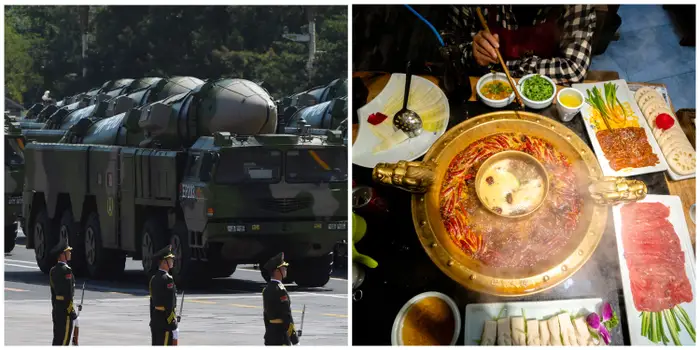According to a former Lieutenant Colonel of the People’s Liberation Navy, widespread corruption and budget deficits are severely undermining the People’s Liberation Army’s capacity to properly equip its troops. He recounted instances where air force personnel resorted to using chunks of solid missile fuel to cook traditional Chinese hotpot meals during his tenure as an officer.
Lt. Col. Yao Cheng, a former staff officer in the Chinese People’s Liberation Army Air Force Command who defected to the U.S. in 2016, highlighted that corruption is widespread in the Chinese military, frequently stemming from inadequate supplies and equipment.
Yao told RFA Mandarin that funds for dinners and gifts are often taken from the equipment budget. Responding to Bloomberg’s report on Xi Jinping’s purge of PLA rocket chiefs, Yao explained that some military departments lack funds, forcing chiefs to divert money from the equipment budget. While the equipment budget could have been sufficient, it becomes inadequate due to misappropriation.
Yao recounted his military days, saying, “We used to drain fuel from aircraft tanks for cooking; it burns green and is odourless.” He added, “For hotpot, we would extract solid fuel from missiles piece by piece due to supply shortages. I often visited the armory to request a small round piece of solid fuel whenever we wanted hotpot.”
Traditional Chinese hotpot involves a communal table-top pot that remains boiling continuously. Guests add raw meat, seafood, and other delicacies to cook as they eat. The pot can be powered by various sources, including electricity or camping stove fuel.
Bloomberg reported that U.S. intelligence assessments revealed Xi’s military purge was due to widespread corruption, which hindered his modernization efforts and raised doubts about China’s war capabilities. The corruption within China’s Rocket Force and defense industry is so severe that U.S. officials now believe Xi is less likely to consider major military action in the near future.
The report highlighted instances of missiles filled with water instead of fuel and non-functional missile silo lids in western China. In July, Xi replaced Li Yuchao as commander of the PLA Rocket Corps, which oversees the country’s nuclear missiles. State media reported that Li and his former deputies, Zhang Zhenzhong and Liu Guangbin, are under investigation by the Chinese Communist Party’s Central Commission for Discipline Inspection.
Media reports indicated that Chinese Defence Minister Li Shangfu was under investigation for corrupt military equipment procurement after disappearing from public view since August 29. Several senior officials from the military’s procurement unit were also implicated. On Friday, Chinese lawmakers approved Adm. Dong Jun, former commander of the People’s Liberation Army Navy (PLAN), as the new defence minister. Adm. Dong Jun replaced Li Shangfu, who was removed from office in October.
A source familiar with the Chinese military, identified only as Duan due to fear of reprisals, couldn’t verify Bloomberg’s report but confirmed that corruption is rampant within the military, describing it as a “closed and independent system.”
“Military corruption far exceeds that in local government,” Duan noted, referencing recent probes into former Central Military Commission vice chairmen GuoBoxiong and Xu Caihou, among other top officials. “Overseas media claim missiles are filled with water instead of fuel,” Duan added. “While we lack definitive proof, it’s entirely plausible.”
Bloomberg’s request for comment from the U.S. Department of Defence was redirected to its 2023 report to Congress on China’s military and defence capabilities. The report noted that Xi quickly “strengthened and accelerated” anti-corruption efforts in the People’s Liberation Army after taking office, thereby consolidating his power.
The CMC Discipline Inspection Commission has targeted power networks and specialties prone to corruption, investigating officers linked to Xu Caihou, GuoBoxiong, and former Chief of Joint Staff General Fang Fenghui. In mid-2023, the PLA launched a probe into corruption in military equipment procurement, showing the anti-corruption campaign is ongoing. The report estimated China’s nuclear warhead stockpile exceeded 500 in May 2023 and could surpass 1,000 by 2030.
The report indicated that by 2022, the PRC likely finished building three new solid-propellant silo fields, comprising at least 300 new ICBM silos, with some already loaded. These fields are located in Yumen (Gansu), Hami (Xinjiang), and Ordos (Inner Mongolia). The project, along with the expansion of China’s liquid-propellant silo force, aims to enhance the peacetime readiness of its nuclear arsenal by adopting a launch-on-warning (LOW) posture. A January 5th commentary in the official Liberation Army Daily emphasized the need for “strict management to enhance combat effectiveness,” especially at the grassroots level, to “prevent minor issues from escalating.” The paper noted, “We must remain vigilant as violations of laws and discipline by individual officers and soldiers at the grassroots level still occur occasionally. Some still fail to restrain themselves and engage in illegal and criminal activities.”

